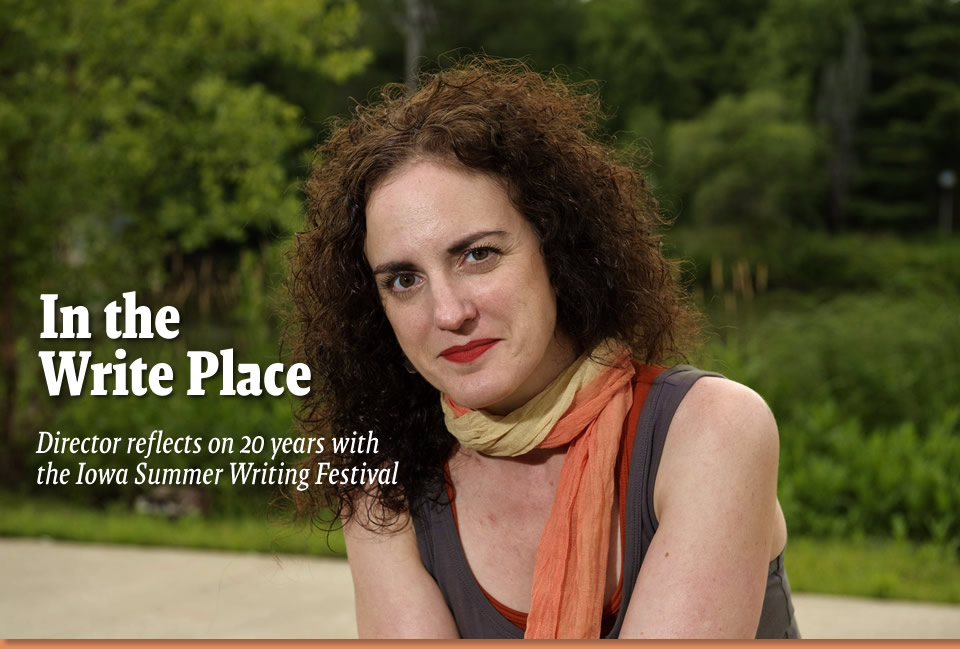-
Page Navigation Links:
- Skip to Site Navigation Links
- Skip to Features

- The University of Iowa
- Spectator
- Monthly News for UI Alumni and Friends
Every summer Amy Margolis (MFA ’92) sees a year’s worth of work come to fruition. It’s when more than 1,200 people from all directions and backgrounds flock to the University of Iowa campus to sharpen their writing skills and commune with like-minded individuals at the Iowa Summer Writing Festival.
The festival, which Margolis has worked with since 1990, offers 140 noncredit weeklong and weekend classes in the months of June and July on the various aspects of writing. Many participants make it an annual tradition: “The thought of a week in Iowa City pushes me to write on those days I just don’t feel like it, and supports me through the dark, dreary, or just boring parts of my daily work life,” comments a four-time festival participant from Nigeria.
Margolis, a Kansas City native and graduate of the Iowa Writers’ Workshop, recently spoke with Spectator@IOWA about what makes the festival successful, why Iowa City is special for writers, and what she has learned after two decades on the job.
What are festival classes like? What can people expect?
The program is among the largest, if not the largest, of its kind in the country. Consequently, we can offer very broad classes across the spectrum of literary genres and forms—the novel, short story, essay, and memoir, for example—and also extraordinarily specific classes, like one we offered for the first time this year called The Indie Dramedy.
The classes are, for the most part, offered as workshop, where the primary text for the week or the weekend is your own creative work. Others are devoted to generating new work through exercises and prompts; in these classes, you’ll be given very specific tasks and you’ll begin to practice the elements of the craft before you even know you’re practicing them.
Who participates in the festival?
It’s such a broad inventory of humanity, they’re almost impossible to characterize. They come from all walks of life—they’re Realtors, doctors, retirees, homemakers, grandmothers. People come with varying degrees of ambition and with different goals and targets in mind. Some want to write the Great American Novel—they want it optioned to the movies, to make a killing, and to see it go to the Ice Capades. Others want to improve their skills so that they can write their family story to leave for their grandchildren. That, to me, is every bit as worthwhile an objective as writing the Great American Novel.
What has surprised you about the festival?
It’s still stunning to me how far people go, and how fast, with just a little bit of training. All first writing attempts have a kind of sameness to them. Everybody makes the same mistakes, which is why it makes me so sad when writers have such scorn for their early pages. They’re just exactly like everybody else’s. There’s no shame in it. But with just the merest of tools, people go to the stars, and they get so much better immediately. Maybe it doesn’t surprise me so much as it thrills me. We get such enormous returns and enormous results from really very little, and this is very gratifying.
What have you learned in your 20 years with the festival?
It took me about 10 years in the job, hearing from people year after year about how the festival changed their lives, before I realized that the workshop method actually works. It’s astonishing. You can bring 12 perfect strangers together who really have nothing much in common, who come from such a disparate, wide swath of experience and background, and they don’t just tear each other to pieces. They accomplish something. Who’d’a thunk it?
This chemistry, or whatever it is that happens in workshop—the bonding and staying in touch, and then coming back and making new bonds and deepening and developing those—is not exceptional. It happens all the time. It happens most of the time. You may have one workshop that’s more scintillating than another, but in all the time I’ve been here, I’ve never seen it not work.
Does being in Iowa City factor into that?
Yes, in the sense that writers think when they come to Iowa City that they’re coming to the center of the action. But the truth is they’re coming to the center of the action because they’re bringing the action with them. People don’t just arrive here and breathe our air and start thinking bigger thoughts. They create the climate. It doesn’t exist without them.
When people ask, ‘Why Iowa?’ The answer is simply that this was the first institution, and by extension the first community, to recognize creative writing as a discipline. That’s how I understand it. Writers are regarded as insiders here in a way that they simply are not elsewhere. That sense of belonging is what we can brag: ‘Come, and you will be among friends, among your own.’ And the broader community is very friendly to writers. In the circles I moved in before I came here, writing wasn’t thought of as much of a vocation. It didn’t count. Here, it does.
What are your goals for the festival?
Our aim is still to bring writers together to develop and share their work in a community that wishes it well. My hope is that your time here will fortify you with instructions, with tools of the trade, with community, with fans, with well-wishers, whatever it is you need to give you the spine and the wherewithal to chase down what you’re after.
— Sara Epstein Moninger
with photo by Kirk Murray
To learn more about the Iowa Summer Writing Festival, see
www.continuetolearn.uiowa.edu/iswfest.
© The University of Iowa 2009
